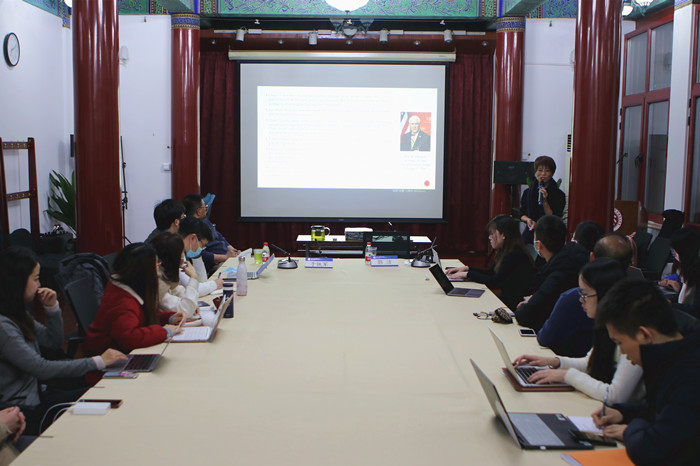On the evening of December 11th, 2020, the Institute of International Strategic Studies (IISS), Peking University (PKU) held the 46th seminar of "North Pavilion Dialogue" lecture series. Guo Jie, tenured associate professor, School of International Studies (SIS), PKU, gave a lecture on "Latin America - A New Battlefield for the Game between the U.S. and China?” The lecture was hosted by Yu Tiejun, Vice President, IISS, PKU and Professor, SIS, PKU.

Prof. Guo said that the evolving U.S.-China relations would have a spill-over effect in Latin America, a close neighbor of the U.S. However, the bilateral relations between China-Latin America had little intersection with those of the U.S.-Latin America. In addition, strategically, Latin America was becoming less and less important to the U.S. from pre-Cold War, Cold War to post-Cold War. Latin America played only a supporting role as the center of the triangle.
In the face of China deepening relations with Latin America, Trump went back to the Monroe Doctrine in an attempt to "push Chinese influence out" of the Western Hemisphere. Why was the U.S. so alert and overreacting to China-Latin America relations? Prof. Guo analyzed in detail the U.S. concerns.
Firstly, despite its rapid growth, China- Latin America trade has not affected the U.S. interests in Latin America for the reasons of huge gap in trade volume and no overlap in major trade between China and the U.S. in Latin America. Secondly, in recent years, the flow of investment and the amount of financing simply could not constitute a threat to the U.S. In addition, fearing the Belt and Road Initiative’s success in Latin America, the U.S. deterred Latin American countries from joining it. At the same time, the U.S. reformed its development financing to strengthen support for Latin America, and also launched an expanded version of the "Growth in the Americas" Initiative to prevent China's expansion in Latin America. Prof. Guo also pointed out that China's dominance in the construction of the China-CELAC Forum platform has aroused the hostility of the U.S. And on the Taiwan issue, China has not even tried to lure Latin American and the Caribbean countries that maintained diplomatic relations with Taiwan. Therefore, both in terms of willingness and ability, China could hardly pose a substantial challenge or threat to the U.S. interests in Latin America. Therefore, the idea of making Latin America the main battleground in the struggle against the U.S. was dangerous.
Finally, Prof. Guo offered suggestions on how to build a normal triangular relationship between China, the U.S. and Latin America. Prof. Guo believed that the U.S. needed to realize that a more prosperous, equal, and stable Latin America was in the interest of the U.S. Therefore, possible cooperation between the U.S. and Latin American countries, as well as other countries, on issues of common interest should be a policy goal, not the other way around. On the other hand, China should have a more objective and dispassionate judgment on the U.S.-Latin American consensus and Sino-Latin American differences, changing self-oriented inertial thinking. Importantly, as a great power, China should give, when possible, more humanistic concerns to the Latin American structural social problems than the consideration of interests in the context of the COVID-19 pandemic.
In the Q&A session, Prof. Guo discussed with the audience challenges that China must confront, such as the swing of the left-wing and right-wing in Latin America, the lack of Chinese investment, the diplomatic direction of China and Nicaragua, and the weakness of Chinese research on Latin America. (Contributed by Pan Lingzi)
Editor: Li Fangqi, Zeng Chuyuan Photographer: Zheng Peijie

